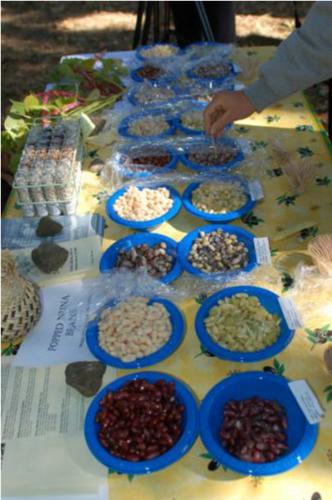eOrganic authors:
Micaela Colley, Organic Seed Alliance
Brian Baker, Organic Materials Review Institute
This is an Organic Seed Resource Guide article.
National Organic Program Regulations on Organic Seed
Since 2002, organic producers have been required to use organic seed when commercially available according to the National Organic Program (NOP) regulations. The NOP requirement for certified organic seed states “…The producer must use organically grown seeds…except…non-organically produced, untreated seeds and planting stock may be used to produce an organic crop when an equivalent organically produced variety is not commercially available…” (§ 205.204). This exception, or loophole, which allows farmers to plant untreated conventionally-produced seed if they can document commercial unavailability, has been slow to close. Many farmers claim that there are limited choices and sometimes poor quality of certified organic seed. Many seed companies claim that there is no consistent demand for organically produced seed and they are hesitant to produce organic seed when market demand is not strong and predictable. Many individuals and organizations involved in the organic industry, including the National Organic Standards Board, have requested that certification inspectors and certifying agents enforce § 205.204, as this would close the loophole and establish a strong and more predictable market for organic seed. The reasoning is that the demand would then stimulate production, which would increase the varietal availability and quality of organic seed. While the loophole has not yet closed completely, many certification agencies have increased their enforcement of § 205.204, and commercial availability of organic seed has increased significantly since the inception of the rule in 2002. Nonetheless, farmers and certifiers are sometimes still challenged to 1) define "commercially available", 2) identify all available sources of organic seed, and 3) find quality organic seed of all varieties grown by organic farmers.

Organic bean seed tasting from variety trials conducted by Carol Miles, Washington State University. Photo credit: Micaela Colley, Organic Seed Alliance
What is required for seeds to be sold as organic?
Seeds that are sold as organic must meet all of the requirements for the production of organic food. In the United States, that means the land in which the seed crops are grown cannot have substances prohibited for organic production applied for three years prior to harvest. The operation must be certified organic by an accredited certifying agent and be managed according to an organic system plan that is approved by the accredited certifying agent.
Are organic farmers required to plant organically produced seeds?
Organic producers are required to use organically grown seeds and planting stock, unless the variety or its equivalent is not commercially available from an organic source. Annual seedlings must be grown organically, with the only use of nonorganic annual seedlings being for re-planting in cases of natural disasters, recognized as such by the USDA. Seeds for sprouting must be organically grown without exception. Genetically engineered seeds, planting stock, and seed innoculants, defined as "excluded methods in the NOP regulation, are prohibited.
Can organic seeds be treated?
Most seed treatments, such as synthetic fungicides and insecticides, are prohibited. There are a few natural substances and allowed synthetic substances that can be applied to organic seeds. These include biological seed treatments, clays, and botanicals.
Sourcing Organic Seed
While the sources, quantity and diversity of organic seed available is certainly growing, it can still be difficult to locate organic seed of specific varieties. Organic producers are required to use organic seed when “commercially available” according to the NOP regulations, however there is currently no comprehensive list of all commercially available seed. For many years the standard requirement of organic certification agencies has been for producers to search at least three seed catalogs for availability of their preferred varieties. Producers may be familiar with a few older, well established companies who specialize in organic seed, but increasingly the web is becoming the best tool to find new sources and search for specific crops or varieties. Several organizations support websites with lists and links to companies selling organic seed.
Companies Selling Organic Seed
California Certified Organic Farmers publishes a list of companies selling organic seed, and the SeedLinked website search function can be narrowed to search for only organic varieties.
- Organic seed listings [Online]. California Certified Organic Farmers (CCOF). Santa Cruz, CA. Available at: http://www.ccof.org/documents/organic-seed-source-regulations-and-resources (verified 11 Mar 2010).
- SeedLinked. https://app.seedlinked.com/en-US/seeds/search (verified 13 Jan, 2023).
References and Citations
- Agricultural Marketing Service - National Organic Program [Online]. Agricultural Marketing Service, United States Department of Agriculture. Washington, DC. Available at: http://www.ams.usda.gov/nop (verified 11 Mar 2010).



